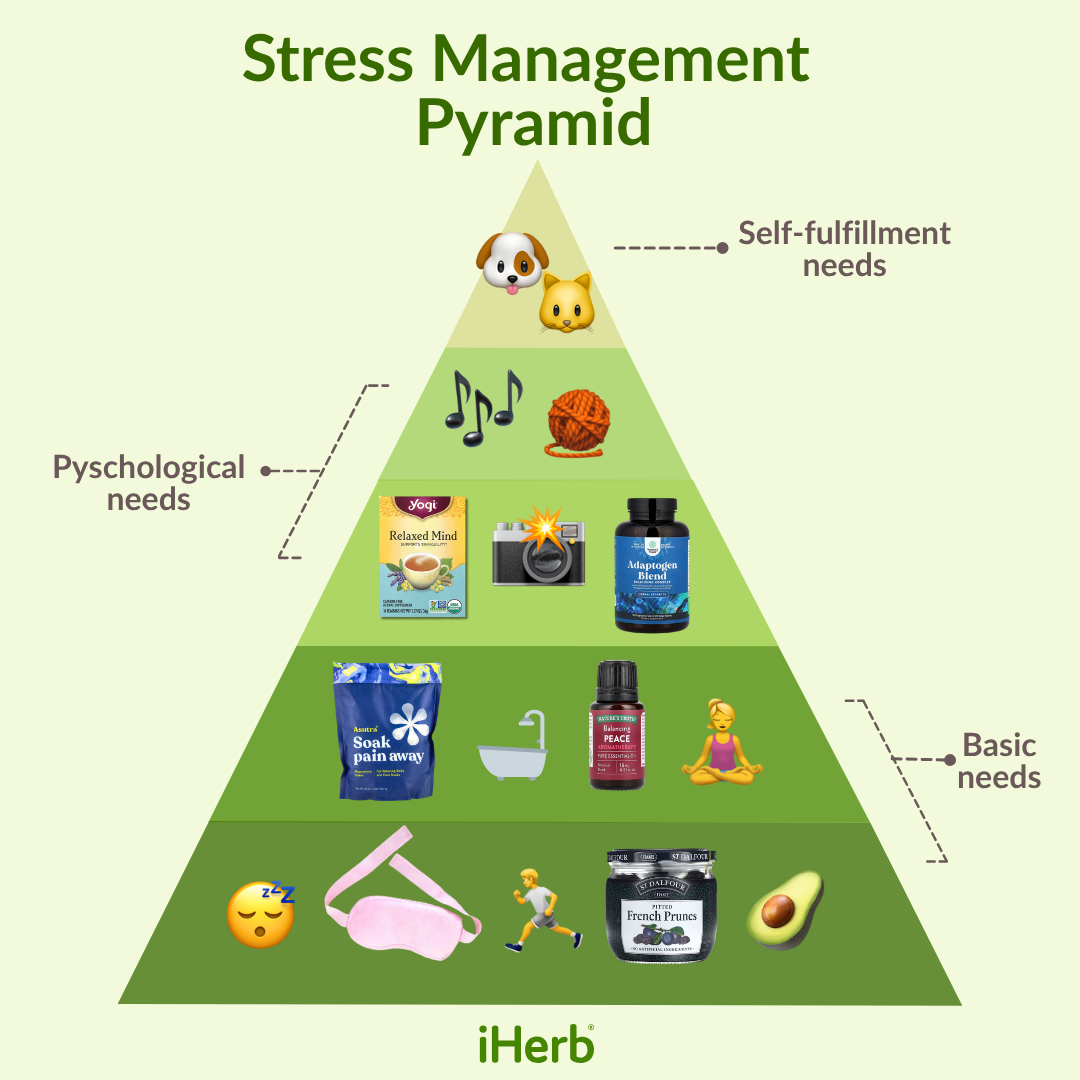Stress Management: 10 Science-Backed Ways To Reduce Stress

Key Takeaways
- Stress is the body's natural "fight or flight" response to perceived threats, releasing hormones like cortisol. While helpful in the short term, chronic stress can negatively impact health.
- Unmanaged chronic stress can lead to physical symptoms like headaches and fatigue, and suppress the immune system.
- The most effective stress management techniques involve a combination of lifestyle changes (diet, exercise, sleep), relaxation practices (breathing), and targeted natural support (adaptogens).
The Stress Response
All of us know what stress feels like. At times, it may seem that feeling “stressed out” is part of modern life, but stress has been a part of the human experience from the very beginning. It is a built-in call to action designed to mobilize us away from danger.
Undoubtedly, you can recall how you felt when adrenaline and other stress hormones surged through your body to produce the classic “fight or flight” response many times in your life. This response was designed to help us escape a physical threat. But nowadays it is not a lion or tiger that triggers the stress response, it is things like financial pressures, work issues, relationship woes and arguments, and countless other "stressors" most of us are faced with throughout the day.
The Negative Effect Of Stress
In many situations, the stress response is so mild that it goes entirely unnoticed. However, it still produces the release of stress hormones. This can still lead to the side effects of chronic stress, such as insomnia, depression, fatigue, headache, upset stomach, digestive disturbances, irritability, and many other issues.
Common Physical Symptoms Of Stress
- Headaches
- Muscle Aches
- General Body Aches
- Rapid Heartbeat or Palpitations
- Chest Pain
- Dizziness
- Stomach Aches and Cramping
- Nausea
- Changes In Bowel Habits
- Fatigue
- Frequent Colds and Infections
- Changes In Libido
- Sleep Problems
Stress And The Immune Response
Stress has a complex, dual effect on the immune system. In the short term, acute stress can actually stimulate your immune response as a protective measure, sending immune cells to areas of the body most likely to face injury or infection. However, this response can be harmful to those with existing inflammatory or autoimmune conditions.
Conversely, chronic stress lasting for weeks or months suppresses the immune system. This is largely due to the overproduction of the stress hormone cortisol, which causes the body's cells to become resistant to its signals. As a result, research shows that individuals under chronic stress are more susceptible to catching colds, experience delayed wound healing, and have a weaker immune response to vaccinations.
Fortunately, there are control mechanisms in the body geared toward counteracting the effects of stress. We can help that process by practicing stress management. Here are some important components of a stress-busting lifestyle.
Foundational Strategies For Stress Management

Optimize Your Diet And Avoid Sugary Foods
Foremost in a successful stress management program is to avoid refined sugars, especially sucrose and high fructose corn syrup; pastries; doughnuts; beverages packed full of sugars (soft drinks, sports drinks, and many coffee beverages); and other high-sugar foods. The sugars in these foods are quickly absorbed into the bloodstream, causing a rapid rise in blood sugar, leading to poor blood sugar control. This, in turn, leads to the excess release of cortisol, a stress hormone produced by the adrenal glands.1
Elevated cortisol levels are not only associated with increased feelings of stress but also with insomnia, depression, loss of appetite control, cravings for sugar, and weight gain. Too much cortisol is also linked to the weakening of the immune system, loss of muscle mass, osteoporosis, cardiovascular disease, and brain atrophy. Many of the harmful effects of chronic stress are directly related to too much cortisol.
Prioritize High-Quality Sleep
High-quality sleep is a critical component of a stress management program as well as helping people deal with depression, anxiety, or low energy levels. Poor sleep quality reduces the ability to deal with stress, while on the flip side getting a good night’s sleep dramatically enhances the ability to deal with stress.
The most effective ways to improve sleep quality are based on identifying and addressing factors that impair sleep. For example, continuous blood sugar monitoring has shown that nighttime fluctuations in blood sugar levels are the major cause of sleep maintenance insomnia. This common type of insomnia is characterized by people being able to get to sleep, but they awaken 3 to 5 hours later and have a difficult time falling back into sleep. What I have found is that most people with sleep maintenance insomnia suffer from faulty blood sugar control. Taking advantage of dietary, lifestyle, and supplement recommendations to improve blood sugar control can help many people with sleep maintenance insomnia get the good night’s sleep they need and desire.
An even simpler step that helps many people improve sleep quality is eliminating caffeine and alcohol. Both can disrupt sleep, leading to a decreased ability to handle stress effectively.
There are a variety of natural products that have been shown to improve sleep quality. Most notable are magnesium, melatonin, 5-HTP, and valerian. For more information on these popular sleep aids, go to my article “The 6 Best Natural Supplements for Sleep.”
Get Regular Physical Exercise
Exercise is one of the most powerful stress-busters available. When you exercise, your brain naturally releases endorphins while at the same time improving cortisol regulation.3 This combined approach positively affects your mood, helping you to release negative emotions, relieve stress, and feel happier. The effects of endorphins can last for several hours after a workout.
You do not have to be an athlete to enjoy the positive, stress-reduction effects of regular exercise. Consider taking a 30- to 60-minute walk outdoors. Find a beautiful park and admire nature. During inclement weather, you could walk around a mall. Visiting the gym provides you with the opportunity to use workout equipment and challenge yourself. A combination of aerobic exercise and weightlifting can help you build muscle and increase your metabolism.
After a particularly stressful day, there is a level of satisfaction in burning off stress through exercise. Find an activity that you enjoy and commit to a regular routine. If you have issues with your knees, hips, or other joints, try low-impact exercises such as swimming or yoga. If you are bored with your usual workout routine, try something new. Rock climbing, including indoor climbing, exercises your whole body while providing you with a challenge. Play some inspiring music to get your body moving while you exercise.
In-the-Moment Relaxation Techniques
Practice Deep Breathing Exercises
Learning to calm the mind and body involves the use of relaxation exercises that elicit a physiological response known as the relaxation response. This response is exactly opposite to the stress in that it calms the mind, slows the heart rate, lowers blood pressure, directs blood flow to internal organs, and promotes healing.
Examples of techniques used to produce the relaxation response include meditation, prayer, deep breathing exercises, and certain forms of yoga. The key factor in any of these techniques is diaphragmatic breathing.
To improve breathing with your diaphragm and promote the relaxation response, practice the following deep breathing exercise for at least five minutes a day. You can do it either sitting comfortably or lying down.
- 4-7-8 Breath: Developed by Dr. Andrew Weil and recommended by Dr. Anne Kennard, this technique quickly decreases the stress response by lengthening your exhale. Inhale for a count of 4, hold your breath for a count of 7, and then exhale slowly for a count of 8. Dr. Kennard notes that it only takes about four rounds to feel a rapid change and that it can be used any time you feel overwhelmed.
Of course, there is more to dealing with stress than learning how to breathe. But engaging the diaphragm and learning how to truly relax is the first step.
Take It Easy With A Bath
Taking a long bath is a simple pleasure that can also help to alleviate stress and promote relaxation. You can enhance that effect by making it a bubble bath, or a mineral or Epsom salt bath to help further relax your mind as well as your muscles, ligaments, and tendons. You can also add a few drops of your favorite essential oils to the bathwater.
Use Calming Essential Oils
Essential oils are also helpful for the management of stress. Try essential oils such as lavender, rose, and geranium. These essential oils help with the reduction of stress and the improvement of mood. There are numerous ways that you can use these relaxing essential oils. You can add one drop of essential oil per ounce of shampoo or conditioner. Essential oils can also be dabbed onto your pulse points, such as the insides of your wrists. The heat from your body activates the oils. Another way to use essential oils is to find a small glass vial with a cork. Make sure that the glass vial is outfitted with a clasp so that you can wear it as a necklace. The oils will diffuse out of the cork, providing their stress-reduction benefits all day.
Natural And Herbal Support For Stress
Try Taking An Adaptogen
Adaptogens are botanical medicines that help us adapt to (cope with) stress. Adaptogenic plants have historically been used to:
- Restore vitality.
- Increase feelings of energy.
- Improve mental and physical performance.
- Prevent the negative effects of stress and enhance the body’s response to stress.
The most notable adaptogens are Chinese or Korean ginseng (Panax ginseng), rhodiola (Rhodiola rosacea), and ashwagandha (Withania somnifera). All of these plants exert beneficial effects on adrenal function and enhance resistance to stress.4
I would recommend trying Ashwagandha first. Studies with high-quality extracts like KSM-66® and Sensoril® show that ashwagandha goes a long way in helping to combat stress because it lowers the adrenal stress hormone cortisol, while at the same time increasing the anti-stress adrenal hormone DHEA. Ashwagandha also improves sleep quality, and, as a result, it boosts energy levels, mood, and the threshold for feeling stressed. It has also been shown to improve the quality of life, and mental and physical capacity.5
Drink A Calming Tea
In addition to adaptogenic herbs, many herbal teas promote feelings of calmness and relaxation. The act of making tea is also relaxing. It shows your intention to relax and take time for yourself.
One of the more popular relaxation teas is Chamomile tea. It can promote feelings of relaxation to help reduce anxiety and promote a good night’s sleep. Because chamomile tea is caffeine-free, you can drink a cup of it about 30 minutes before bedtime to promote a good night's sleep.
Another popular tea for a relaxing effect is peppermint. This tea provides benefits such as good digestion and enhanced relaxation. Peppermint tea is also free of caffeine, which makes it a good choice for drinking before bedtime.
Incorporate Stress-Relieving Activities
Relieve Stress Through Hobbies
Try engaging in some creative endeavors or hobbies as a form of stress management. Many forms of art offer ways to relieve your stress. For example, working with clay in a ceramics class is an ideal way to release tension. Pounding the clay to get the air bubbles out allows you to vent any pent-up frustration. The repetitive action of rolling the clay helps you relax. The act of forming the clay into a shape allows you to focus on something outside of yourself. Glazing your ceramic artwork is also a soothing process.
The repetitive movements of sewing, knitting, crocheting, or coloring in a coloring book are ideal for stress relief as well. Some other stress-busting hobbies to consider include painting, gardening, weaving, spinning, and doing puzzles and crossword puzzles. Some people find stress relief in other productive activities, such as cleaning and cooking.
Spend Time With Pets
Consider spending some time with animals. The simple, repetitive act of stroking or brushing a cat or dog is known to lower cortisol levels and blood pressure and relax your body and mind.6 In most cases, pets are happy to oblige. The affection of a dog or the purring of a cat can be quite relaxing, and the pet's physical warmth is soothing to your weary body.
If you do not have a pet, consider volunteering at your local shelter. Walking the dogs or grooming the cats benefits you and the animals. Horseback riding, bird watching, sitting back at an aquarium, and watching the fish swim can also help you reduce stress.
In Conclusion…
Everyone experiences stress to some degree. However, if stress is overwhelming you, it is critical to focus on positive ways of coping and refining your stress management program. Learning healthy ways of managing stress will promote better overall health and well-being, and it just makes life easier.
References:
- American Psychological Association. “Stress Effects on the Body.” American Psychological Association, 21 Oct. 2024, www.apa.org/topics/stress/body.
- Lopez-Cepero A, Rosal MC, Frisard C, Person S, Ockene I, Tucker KL. Changes in Glycemic Load Are Positively Associated with Small Changes in Primary Stress Markers of Allostatic Load in Puerto Rican Women. J Nutr. 2020 Mar 1;150(3):554-559.
- Jones C, Gwenin C. Cortisol level dysregulation and its prevalence-Is it nature’s alarm clock? Physiol Rep. 2021 Jan;8(24):e14644.
- Moyers SA, Hagger MS. Physical activity and cortisol regulation: A meta-analysis. Biol Psychol. 2023 Apr;179:108548.
- Todorova V, Ivanov K, Delattre C, Nalbantova V, Karcheva-Bahchevanska D, Ivanova S. Plant Adaptogens-History and Future Perspectives. Nutrients. 2021 Aug 20;13(8):2861.
- Akhgarjand C, Asoudeh F, Bagheri A, et al. Does Ashwagandha supplementation have a beneficial effect on the management of anxiety and stress? A systematic review and meta-analysis of randomized controlled trials. Phytother Res. 2022 Nov;36(11):4115-4124
- Rodriguez KE, Graham DJ, Lucas-Thompson RG. The Effect of Mental Activation of One's Pet Dog on Stress Reactivity. Int J Environ Res Public Health. 2023 Oct 30;20(21):6995.
- Huang Y, Chen Z, Chen B, Li J, Yuan X, Li J, Wang W, Dai T, Chen H, Wang Y, Wang R, Wang P, Guo J, Dong Q, Liu C, Wei Q, Cao D, Liu L. Dietary sugar consumption and health: umbrella review. BMJ. 2023 Apr 5;381:e071609. doi: 10.1136/bmj-2022-071609. PMID: 37019448; PMCID: PMC10074550.
- Ma, Xiao, et al. “The Effect of Diaphragmatic Breathing on Attention, Negative Affect and Stress in Healthy Adults.” Frontiers in Psychology, vol. 8, no. 874, 6 June 2017, pp. 1–12, www.frontiersin.org/journals/psychology/articles/10.3389/fpsyg.2017.00874/full, https://doi.org/10.3389/fpsyg.2017.00874.
- De Nys, Len, et al. “The Effects of Physical Activity on Cortisol and Sleep: A Systematic Review and Meta-Analysis.” Psychoneuroendocrinology, vol. 143, no. 143, Sept. 2022, p. 105843, pubmed.ncbi.nlm.nih.gov/35777076/, https://doi.org/10.1016/j.psyneuen.2022.105843.
- National Institutes of Health. “Office of Dietary Supplements - Ashwagandha: Is It Helpful for Stress, Anxiety, or Sleep?” Ods.od.nih.gov, 24 Oct. 2023, ods.od.nih.gov/factsheets/Ashwagandha-HealthProfessional/.
- Saadatmand S, Zohroudi F, Tangestani H. The Effect of Oral Chamomile on Anxiety: A Systematic Review of Clinical Trials. Clin Nutr Res. 2024 Apr 23;13(2):139-147. doi: 10.7762/cnr.2024.13.2.139. PMID: 38784853; PMCID: PMC11109927.
- Sakshi Vats, et al. “Analysing the Therapeutic Potential of Epsom Salt across Multiple Human Physiological Systems: A Comprehensive Review.” JOURNAL of CLINICAL and DIAGNOSTIC RESEARCH, 1 Jan. 2024,
- Donelli D, Antonelli M, Bellinazzi C, Gensini GF, Firenzuoli F. Effects of lavender on anxiety: A systematic review and meta-analysis. Phytomedicine. 2019 Dec;65:153099. doi: 10.1016/j.phymed.2019.153099. Epub 2019 Sep 26. PMID: 31655395.
DISCLAIMER:This Wellness Hub does not intend to provide diagnosis...
















































































 Table of Contents
Table of Contents
















